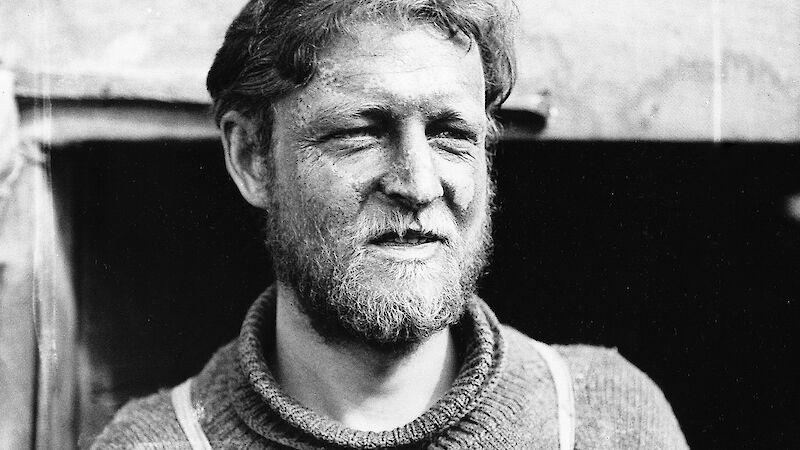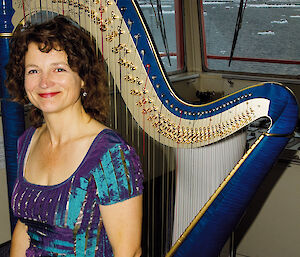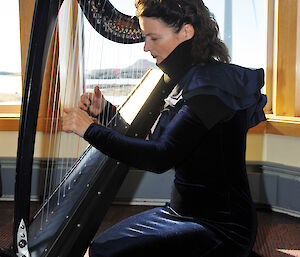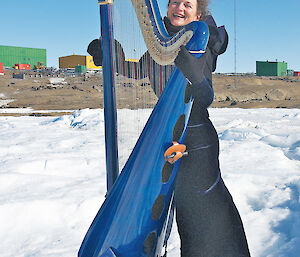Harpist, Alice Giles, travelled to Antarctica on an Australian Antarctic Arts Fellowship, almost 100 years since her grandfather stepped ashore with the first Australasian Antarctic Expedition (AAE).
As my grandfather Cecil Thomas Madigan, meteorologist on the AAE of 1911–1914, sat in the hut at Commonwealth Bay, he meticulously recorded in his diary the hymns he enjoyed singing and the gramophone records that brought him cheer, describing how live and recorded music was an essential component in maintaining equilibrium. Today, 100 years later, there remains very little music written by Australian composers that directly relates to Antarctica, even though Australians have had a consistent presence on the continent.
As recipient of an Antarctic Arts Fellowship my main aim was to combine the historical music and words of that original AAE with especially written contemporary music, and perform this live on the Antarctic continent. The concept of performing a concert in Antarctica was unusual, but hopefully my adventure will open this to future discussion and consideration.
There was very little time, from receiving confirmation of my Fellowship to the ship’s departure in February (2011), to commission new pieces and to construct the program. I selected pieces mentioned in the Madigan diaries as a start. The composers I asked to become involved in the project — Larry Sitsky, Jim Cotter, Martin Wesley-Smith and Joshua McHugh — came back to me with a range of excellent pieces reflecting their individual concepts of Antarctica. I then selected excerpts from the diaries to connect everything together. Wesley-Smith’s piece ‘Aurora Wynnis’ includes sung and spoken words from the diaries referring to my grandmother, at that time Madigan’s fiancée.
Meanwhile, Australian National University (ANU) staff trained me in recording and editing techniques, as I was to be a one-woman production team. I also shipped off my large electro-acoustic harp and my recording, video and electro-acoustic equipment to the wharf in Hobart. I had been hoping to live-stream the concert from Mawson station, but on learning that the available bandwidth was too small, I arranged to send back shorter sound and video clips instead. I set up a blog site which would comprise the ‘live’ element of the adventure.When deciding what type of instrument to take I had to consider the intense cold and dry atmosphere of Antarctica, so I settled on an electro-acoustic harp rather than my acoustic harp. I also took a small lever harp made by Tasmanian Andrew Thom, for practice during the ship voyage and for any outside performances. Sitsky wrote a second piece for this small harp and I was able to play and video this outside on several occasions at Davis and Mawson stations. I found it especially appropriate next to the elephant seals and the rocks, as it had a rather deep, sombre character.
My time on the Antarctic continent was more limited than I expected and I had very little opportunity to make outdoor recordings because of the inclement weather. I ended up with two half days at Davis and one afternoon at Mawson where the wind was not too high to go outside and record! I did collect some sounds of the wind playing the strings of the harp, the swish of the slushy ice in the bay, the wind itself, and the operatic bass of the elephant seals. I also recorded the marvelous machinations of the Aurora Australis engine room and the ship cracking through the sea ice. These recordings will be shared with the composition and digital arts students of the ANU. I am also putting together a selection of photographic images from the voyage to accompany future performances of the program I gave at Mawson station. This will open the ANU Conference Antarctica-Sounds and Cultural Connections in June and I hope many subsequent performances.
My blog became a creative focus for me in an unexpected way as it forced me to organise my thoughts and feelings as the voyage progressed. I am very glad now that I have this to fall back on as I rapidly become re-assimilated in that strange other world — real life. I am now considering the best ways to use that written material alongside the audio-visual records. The blog felt different from a diary because I saw it as a performing artist would and tried to translate my ‘in the moment’ emotions and experiences of the senses to a broad readership. Throughout the wonderful ship voyage and on the continent itself, I felt able to think more clearly and creatively, feel more extremely and tap into more energy than usual. One fellow expeditioner confessed to a similar experience; I wonder if this is common?
Many times during the voyage I was asked about what I was going to compose. It is hard to explain the division in classical music between composer and performer. Classical composition is a highly sophisticated skill that is studied and practiced, just as a performer practices long hours and focuses on their own skill set. Very few people are able to combine the two skills. Although I did turn my hand to a couple of small musical sketches I consider them, alongside some brief improvisations outside in response to the environment, as a diary entry. Performance for me is a special kind of creativity, bringing something very important to life and communicating the abstract and complex emotions and symbols it contains to the direct experience of the listener. Performance in a particular space and in relation to nature has now become a matter of great interest to me and will engage much of my thought in the future.My fellow expeditioners were all incredibly supportive of my performances and provided me with warm encouragement and responsiveness. This illustrated to me the need to consider musical performance as a vital part of Antarctic life, just as it is a vital part of all human existence anywhere. Recorded music has a quite different function and affect that is not a substitute.
When I look back it is difficult to pinpoint highlights of the trip because it is the overall impact that is strongest for me. I am sure this is familiar to other expeditioners; with life trimmed to essentials, the feeling of being privileged to enter into another world for a short time, a world where nature is still overwhelmingly dominant, pristine and powerful. Although I live on a beautiful 17 hectare property, the life I lead is hectic and relentless. To express the essence of nature in performance is to have experienced its essence in the quiet of the soul. Playing a concert in front of the windows of the Red Shed at dawn, improvising on the beach at Davis, or imagining what music I would hear in my heart while on the heaving Southern Ocean; these experiences helped me engage with nature in a way I had never considered at home.
ALICE GILES
Head of Harp Area, Australian National University




